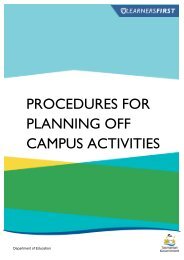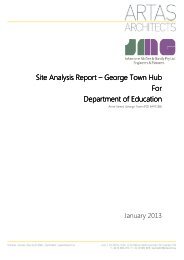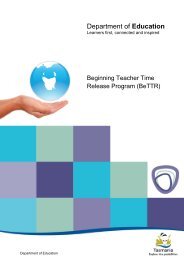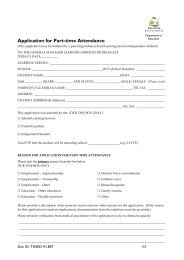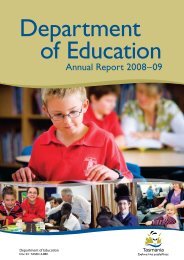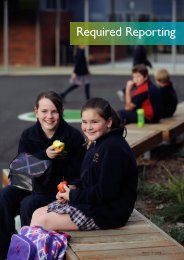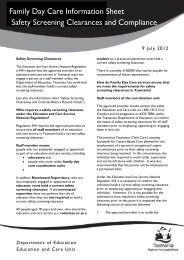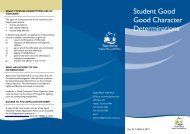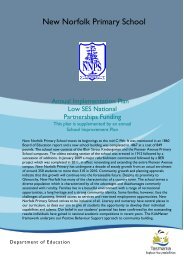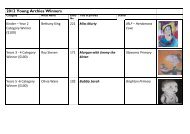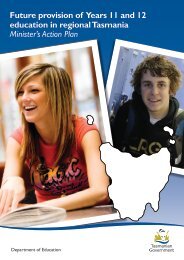Department of Education
DoE Annual Report 2010-2011 - Department of Education
DoE Annual Report 2010-2011 - Department of Education
- No tags were found...
Create successful ePaper yourself
Turn your PDF publications into a flip-book with our unique Google optimized e-Paper software.
Direction<br />
Major<br />
Initiatives<br />
Retention<br />
and<br />
Attainment<br />
Strategy<br />
The <strong>Department</strong> <strong>of</strong> <strong>Education</strong>’s goal for all Tasmanians<br />
is that they gain appropriate skills and qualifications to<br />
enable them to participate in a globalised, creative and<br />
innovation-based community and economy.<br />
To this end, the department is progressing the<br />
implementation <strong>of</strong> an evolved model <strong>of</strong><br />
post-Year 10 education and training in 2011.<br />
Amendments to legislation that came into effect from<br />
1 January 2011 have brought the Tasmanian Polytechnic<br />
and Tasmanian Academy under the auspices <strong>of</strong> the<br />
department, providing the opportunity for an increased<br />
strategic focus to support the achievement <strong>of</strong> improved<br />
educational outcomes for all Tasmanians.<br />
Through the Tasmanian Polytechnic and Tasmanian<br />
Academy and some district and regional schools, the<br />
department provides post-Year 10 education and<br />
The Retention and Attainment Strategy will guide the<br />
work <strong>of</strong> the department in improving the transition <strong>of</strong><br />
students from Year 10 to further education and training,<br />
and engaging students so they stay in education and<br />
training, and gain a meaningful Year 12 or equivalent<br />
qualification.<br />
A key initiative <strong>of</strong> the strategy is the introduction <strong>of</strong><br />
tracking <strong>of</strong> students from Year 10 to the completion<br />
<strong>of</strong> Year 12 or equivalent. This includes following up<br />
at-risk and disengaged students and supporting their<br />
re-engagement.<br />
The strategy focuses on a range <strong>of</strong> areas to support<br />
transition, engagement and achievement <strong>of</strong> qualifications<br />
including:<br />
• high quality pathway planning<br />
• open and consistent communication between<br />
schools, colleges <strong>of</strong> the Academy and the Polytechnic,<br />
underpinned by a collaborative culture<br />
• a coordinated approach to course <strong>of</strong>ferings<br />
• quality information available to and accessible by<br />
students, parents and teachers<br />
• quality teaching<br />
• quality learning support and learning environments<br />
• relevant and flexible programs.<br />
training opportunities to enable every Tasmanian to<br />
reach their potential at any stage <strong>of</strong> life. The department<br />
aims to nurture a culturally rich, socially cohesive and<br />
economically productive community.<br />
Tasmania’s target is for 90% <strong>of</strong> students to attain Year 12<br />
or its equivalent by 2015 which is the national target set<br />
through the National Partnership Agreement on Youth<br />
Attainment and Transitions. Currently, Tasmania’s rates<br />
<strong>of</strong> participation and achievement in post-compulsory<br />
education and training are lower than most other<br />
Australian states and many OECD countries.<br />
A significant focus for the department is to address<br />
student retention beyond Year 10, and to do so, the<br />
department is working to improve the transition <strong>of</strong><br />
students from Year 10, their engagement in programs in<br />
Year 11 and beyond, and their attainment <strong>of</strong> meaningful<br />
qualifications.<br />
Progress<br />
The strategy has been agreed to by all Year 11 and 12<br />
leaders in the Polytechnic and Academy. It has been<br />
disseminated to secondary school principals through a<br />
range <strong>of</strong> processes including face-to-face meetings and a<br />
workshop.<br />
Work has commenced in conjunction with pathway<br />
planners to develop the transition support processes for<br />
the strategy. Research has been undertaken to investigate<br />
suitable special engagement programs. Colleges have also<br />
commenced work on the development <strong>of</strong> special interest<br />
programs focused on improving retention.<br />
Initial investigation has been undertaken into the<br />
development <strong>of</strong> a student tracking system.<br />
The 2012 Your Guide to <strong>Education</strong> and Training in Years 11<br />
and 12 was disseminated to all secondary schools in June<br />
2011.<br />
Discussions have commenced with district and regional<br />
high schools and Aboriginal <strong>Education</strong> Services to<br />
explore factors affecting the transition, engagement and<br />
achievement <strong>of</strong> students at higher risk <strong>of</strong> disengagement,<br />
as well as possible programs to address these factors.<br />
Post-Compulsory <strong>Education</strong> and Skills Development 31



